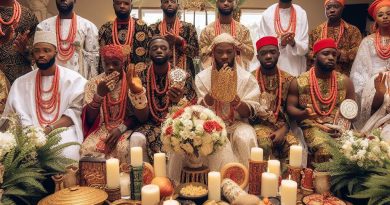How Marriage Contracts Differ from Traditional Vows
Last Updated on January 28, 2024
Introduction
Marriage contracts and traditional vows play crucial roles in the institution of marriage.
Understanding their differences is significant.
Marriage contracts are legally binding agreements that outline the terms and conditions of a couple’s union.
Traditional vows, on the other hand, are customary promises made by the couple during the wedding ceremony.
Understanding the differences between marriage contracts and traditional vows is essential because it affects several aspects of a marriage.
Marriage contracts provide a legal framework for the couple, addressing issues such as property division, finances, and responsibilities.
Traditional vows, on the other hand, have a more sentimental value, emphasizing love, commitment, and support in sickness and health.
Knowing the differences between the two helps couples make informed decisions before entering a marriage.
Marriage contracts allow couples to discuss and establish their expectations, ensuring transparency and minimizing conflicts in the future.
Traditional vows, though emotionally significant, may not provide practical solutions to potential issues that may arise in a marriage.
Furthermore, understanding the differences between marriage contracts and traditional vows can also help couples navigate through divorce or separation.
While traditional vows are spiritual and emotional commitments, marriage contracts provide a legal framework to dissolve the marriage.
In review, comprehending the differences between marriage contracts and traditional vows is crucial as it affects the practical and emotional aspects of a marriage.
By understanding these distinctions, couples can make informed decisions and establish a solid foundation for their union.
Understanding Marriage Contracts
In today’s world, couples have various options when it comes to formalizing their commitment to each other.
One such option is a marriage contract, which differs from traditional wedding vows.
In this section, we will delve into the definition and legal aspects of marriage contracts, how they are typically written and signed, and the importance of clarity and specificity in these agreements.
What is a Marriage Contract?
A marriage contract is a legally binding agreement between spouses that outlines their rights and responsibilities within the marriage.
It is a written document that serves to complement or replace traditional vows.
The Legal Aspects of Marriage Contracts
Marriage contracts are governed by family law and may vary depending on the jurisdiction.
These contracts address issues such as property division, spousal support, and child custody in the event of a divorce or separation.
They offer a level of legal protection and certainty for both parties.
How are Marriage Contracts Typically Written and Signed?
Marriage contracts are usually drafted by lawyers specializing in family law.
Both parties must disclose their assets and debts, ensuring transparency and fairness.
The contract must be signed voluntarily by both spouses and witnessed by two individuals who are not parties to the agreement.
Given the legal nature of marriage contracts, it is crucial to consult with legal professionals to ensure the agreement complies with all legal requirements and adequately protects the interests of both spouses.
The Importance of Clarity and Specificity in a Marriage Contract
Clarity and specificity are key when drafting a marriage contract.
The agreement should leave no room for misunderstanding or misinterpretation.
It should state the intentions and expectations of both spouses clearly.
Provisions regarding property division, spousal support, and child custody should be explicit and comprehensive, considering various scenarios that may arise during the course of the marriage.
This clarity ensures that both parties are aware of their rights and obligations, thus minimizing potential conflicts.
The Benefits of a Marriage Contract
- Protection of individual assets: A marriage contract can safeguard pre-existing assets, inheritance, or business interests.
- Clarifies financial obligations: The agreement can stipulate each spouse’s financial responsibilities during the marriage and in the event of a divorce.
- Reduces conflict and uncertainty: By addressing potential disputes in advance, a marriage contract can minimize disagreements and legal battles in case of separation or divorce.
- Preserves family relationships: A well-drafted contract can help maintain amicable relationships between spouses and ensure effective co-parenting if children are involved.
While marriage contracts are not for everyone, they can offer valuable benefits for couples who wish to formalize their commitments with legal clarity and protection.
A marriage contract is a legal agreement that outlines the rights and responsibilities of spouses in a marriage.
It offers legal protection, clarifies financial obligations, and reduces conflict in case of separation or divorce.
Clear and specific provisions are crucial to ensure an effective and fair agreement.
Consulting legal professionals is essential when drafting a marriage contract to ensure compliance with the law and protect the interests of both parties.
Read: Understanding the Importance of Marriage Rings in Igboland
Traditional Vows
Traditional vows hold cultural significance and reflect values, beliefs, and customs of Nigeria’s diverse ethnic groups.
- Acknowledge family, friends, and ancestors.
- Express love, honor, and commitment.
- Promise support through life’s challenges.
- Emphasize fidelity, trust, and unity.
- Symbolize love, devotion, and commitment.
- Connect to cultural heritage, strengthening identity.
- Unify the couple, their families, and communities.
- Invite support and blessings from witnesses.
Marriage contracts differ, focusing on legal and practical matters:
- Outline rights, responsibilities, and legal implications.
- Promote transparency and fairness.
- Define specific terms and conditions.
- Address provisions for divorce, inheritances, and legal matters.
- Ensure awareness of rights and obligations.
- Employ precise language for clarity.
- Legal documents with practical significance.
Both traditional vows and marriage contracts are vital, celebrating love, emotion, and addressing legal aspects for a strong marriage.
Read: Setting Healthy Boundaries in Nigerian Marital Life
Uncover the Details: Marriage Wisdom: Igbo Phrases and Their Meanings
Differences between Marriage Contracts and Traditional Vows
Marriage contracts and traditional vows differ significantly:
- Marriage contracts are legally binding, focusing on rights, responsibilities, and financial aspects.
- Traditional vows center on love, commitment, and emotional connection, reflecting personal and spiritual beliefs.
- Marriage contracts safeguard interests through financial details, including property, assets, and debts.
- Traditional vows emphasize mutual understanding, support, and love, irrespective of financial circumstances.
- Marriage contracts provide detailed legal frameworks, covering property division, child custody, and more.
- Traditional vows are symbolic and less explicit, highlighting emotional bonds.
- Marriage contracts involve negotiation and drafting by both parties and may require legal consultation.
- Traditional vows are exchanged during the wedding ceremony without negotiation, signifying love and commitment.
- Marriage contracts offer tangible legal protection, ensuring equitable wealth distribution in case of divorce.
- Traditional vows carry emotional significance, witnessed by friends and family, deepening the couple’s emotional bond.
In summary, marriage contracts focus on legal and financial aspects, while traditional vows symbolize love and commitment, fostering emotional connections.
Both are crucial in marriage, balancing practical considerations with emotional depth.
Understanding these distinctions helps couples navigate marriage with clarity and mutual understanding.
Read: Yoruba Wedding Customs: The Role of Marriage Rings

Implications and Considerations
Understanding the differences between marriage contracts and traditional vows is crucial for couples to avoid potential pitfalls and unintended consequences.
Implications and Consequences of Not Understanding the Differences
- Signing a marriage contract without comprehending its terms can lead to legal disputes and financial hardships.
- Misinterpreting traditional vows may create unrealistic expectations and strain the relationship.
- Failure to grasp the differences between the two can result in misunderstandings and conflicts.
- Not understanding the legal implications of a marriage contract may lead to unfair division of assets during a divorce.
- Ignoring the emotional significance of traditional vows can undermine marital intimacy and trust.
- Without knowledge of the distinctions, couples may unintentionally violate the terms of their marriage contract or traditional vows.
The Importance of Incorporating Both Elements
A harmonious marital relationship is achieved by integrating the practicality of marriage contracts and the sanctity of traditional vows.
- Marriage contracts provide a solid foundation by outlining financial responsibilities and asset allocations.
- Traditional vows foster emotional connection and symbolize the commitment between spouses.
- Blending both elements ensures a balanced and comprehensive approach to marriage.
- Recognizing the significance of both components strengthens the partnership and promotes mutual respect.
- Incorporating marriage contracts and traditional vows cultivates a sense of security and stability within the relationship.
The Need for Open Communication and Negotiation
Creating a marriage contract and exchanging traditional vows require open communication and negotiation between partners.
- Couples should openly discuss their expectations, desires, and potential concerns before drafting a marriage contract.
- Negotiation allows couples to find common ground and consider each other’s interests during the contract drafting process.
- Engaging in open communication helps avoid misunderstandings and ensures that both partners are on the same page.
- Negotiating traditional vows allows couples to personalize their promises and align them with their shared values.
- Open communication and negotiation foster trust and understanding, laying the groundwork for a successful marriage.
Benefits of Clearly Defined Legal and Emotional Aspects
Having legal and emotional aspects clearly defined in a marriage brings various benefits to couples.
- Clear definitions in a marriage contract minimize confusion and disagreements regarding financial responsibilities.
- Emotionally, clearly defined traditional vows establish a framework for mutual support and love.
- Legal clarity allows couples to navigate potential conflicts with greater ease and reduces the risk of legal complications.
- Well-defined emotional aspects provide a strong foundation for couples to weather challenges and grow closer together.
- Clearly outlined legal and emotional aspects create a sense of security and stability in the marriage.
In summary, understanding the differences between marriage contracts and traditional vows is essential for a successful and fulfilling marital relationship.
The implications of not grasping these differences can be detrimental to both the legal and emotional aspects of the marriage.
By incorporating both elements and engaging in open communication and negotiation, couples can establish a harmonious balance.
Having legal and emotional aspects clearly defined brings numerous benefits, enabling couples to navigate challenges with confidence and reinforce their commitment to each other.
Read: Nigerian Proverbs and Their Marriage Message Insights
Conclusion
Understanding the differences between marriage contracts and traditional vows is crucial.
A comprehensive understanding allows couples to make informed decisions about their marriage and protect their rights.
Seeking legal advice is essential in navigating marriage contracts and ensuring both parties are protected.
Engaging in open dialogue with partners about marriage contracts and traditional vows can lead to a stronger and healthier relationship.
By discussing and agreeing on these aspects, couples can establish a solid foundation for their marriage and avoid potential conflicts in the future.
Ultimately, having a clear understanding of both marriage contracts and traditional vows can contribute to a successful and fulfilling marriage.


